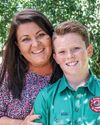
Something extraordinary is happening in crime investigation around the world. Time, long the enemy of the cold case, is becoming a friend. The first 48 hours – when physical evidence is fresh, witness memories are sharp and public interest is high – are still the most vital if a case is to be solved. But quantum leaps in forensic science, genetic geneaology, DNA analysis and media technology are giving today’s detectives new weapons to solve old crimes. And for families and friends who have been left behind, they offer renewed hope.
Everywhere we go we leave traces of ourselves – sweat, blood, fingerprints or skin particles. This material might be microscopic, but adroitly captured and preserved DNA can identify victims and killers years later.
That’s why, in May 2021, South Australian Police’s Operation Persevere exhumed the mysterious ‘Somerton Man’ more than 72 years after he died on Somerton Beach. As scientists try to match his DNA to that of living descendants, special effects artists have reanimated his face into a living, smiling, moving image. Now, having captured the imagination and interest of the public and media, the hope is he will be formally identified, offering resolution to his family at last.
Our appetite for cold case stories, true crime books and police procedurals on TV is insatiable. It emboldens amateur sleuths to fine-tune their own forensic eyes and do detective work of their own. Often the first step is to track our DNA to unlock the secrets of our family trees via intimate data sent to ancestry sites.
Denne historien er fra February 2022-utgaven av The Australian Women's Weekly.
Start din 7-dagers gratis prøveperiode på Magzter GOLD for å få tilgang til tusenvis av utvalgte premiumhistorier og 9000+ magasiner og aviser.
Allerede abonnent ? Logg på
Denne historien er fra February 2022-utgaven av The Australian Women's Weekly.
Start din 7-dagers gratis prøveperiode på Magzter GOLD for å få tilgang til tusenvis av utvalgte premiumhistorier og 9000+ magasiner og aviser.
Allerede abonnent? Logg på

Maggie's kitchen
Maggie Beer's delicious veg patties - perfect for lunch, dinner or a snack - plus a simple nostalgic pudding with fresh passionfruit.

Reclaim your brain
Attention span short? Thoughts foggy? Memory full of gaps? Brigid Moss investigates the latest ways to sharpen your thinking.

The girls from Oz
Melbourne music teacher Judith Curphey challenged the patriarchy when she started Australia's first all-girls choir. Forty years later that bold vision has 6500 members, life-changing programs and a new branch of the sisterhood in Singapore.

One kid can change the world
In 2018, 10-year-old Jack Berne started A Fiver for a Farmer to raise funds for drought relief. He and mum Prue share what happened next.

AFTER THE WAVE
Twenty years ago, the Boxing Day tsunami tore across the Indian Ocean, shredding towns, villages and holiday resorts, and killing hundreds of thousands of people from Indonesia to Africa. Three Australians share their memories of terror, loss and survival with The Weekly.

PATRICIA KARVELAS How childhood tragedy shaped me
Patricia Karvelas hustled hard to chase her dreams, but it wasn't easy. In a deeply personal interview, the ABC host talks about family loss, finding love, battles fought and motherhood.

Ripe for the picking
Buy a kilo or two of fresh Australian apricots because they're at their peak sweetness now and take inspiration from our lush recipe ideas that showcase this divine stone fruit.

Your stars for 2025
The Weekly’s astrologer, Lilith Rocha, reveals what’s in store for your astrological sign in 2025. For your monthly horoscope, turn to page 192.

MEL SCHILLING Cancer made me look at myself differently'
One year on from going public with her bowel cancer diagnosis, Mel Schilling reveals where she's at with her health journey and how it's changed her irrevocably.

Nothing like this Dame Judi
A few weeks before her 90th birthday, the acting legend jumped on a phone call with The Weekly to talk about her extraordinary life – and what’s still to come.